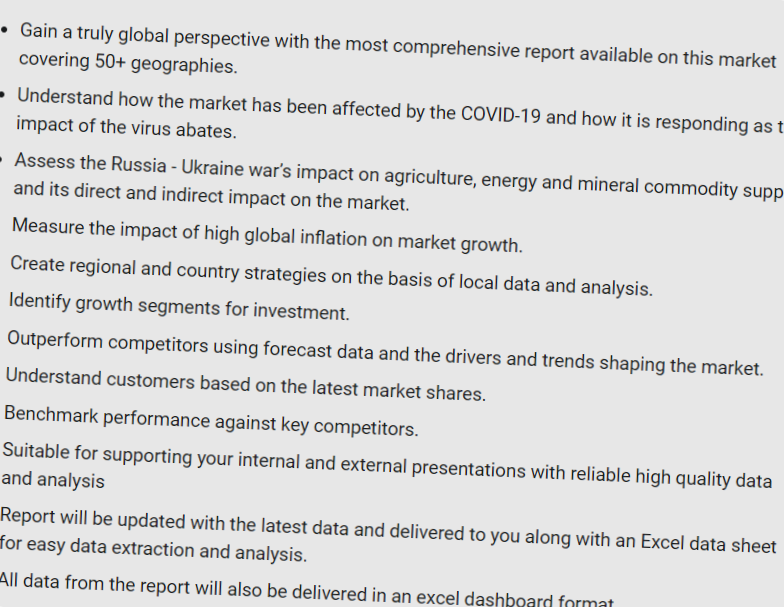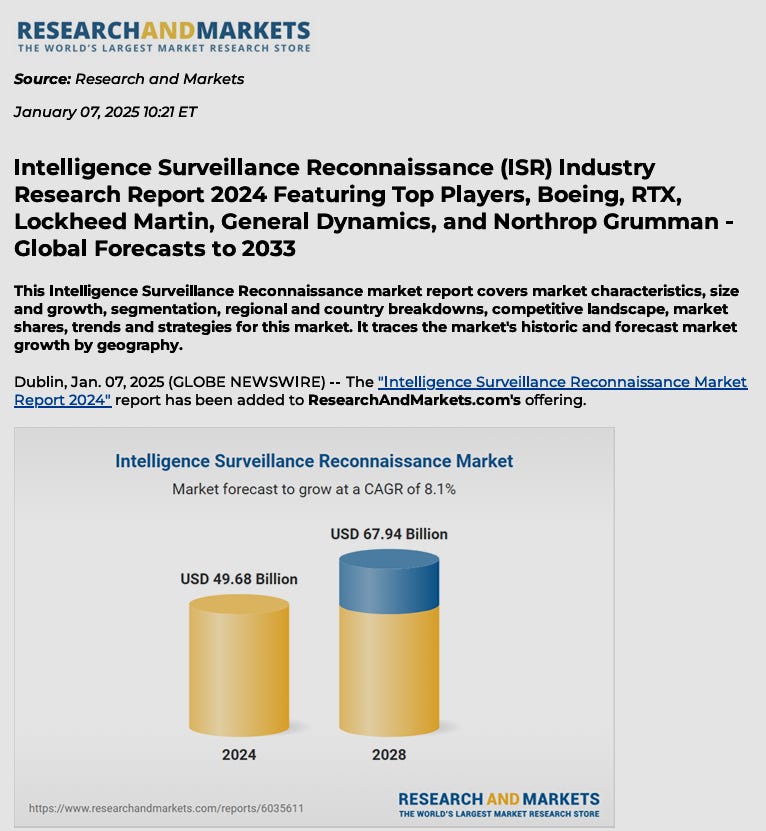Roasting the Press Episode 55 for Sunday, January 19th, 2025
The Growing International Intelligence, Surveillance, and Reconnaissance (ISR) Industry; The Magna Carta in Canada & Food Will Never Be the Same.
The Growing International Intelligence, Surveillance, and Reconnaissance (ISR) Industry
There’s an entrenched, fast growing transnational industry with strong military connections, focused around crafting, controlling and pushing public opinion down paths helpful to elites in business and the military.
It originally developed out of new technologies created for controlling and assessing data collected from drones, global positioning systems and Earth imaging satellites, but its moved far beyond that.
Welcome to the world of intelligence, surveillance and reconnaissance (ISR).
Broadly defined, ISR is a series of activities that provide military decision makers with data relating to situational awareness.
The data collected is then parsed, assessed and acted upon using command, control, communications and computer (C4) systems to create a complete C4iSR system which collects data, assesses and reacts to an opponents actions.
ISR systems are used in all military operations, and have been used in warfare for centuries.
But while the original data collected to support C4iSR activities focused almost entirely on the strategic and tactical capabilities of enemy military formations, new data collection methodologies allow C4iSR systems to collect data on the mindsets of both civilian and military opponents.
These new uses make C4iSR capabilities useful for both civilian and military players. For both, the control of civilian public opinion is the ultimate objective.
ISR collection methods include the following:
Intelligence, which involves the passive collection, processing, analysis, and dissemination of information to understand the operational environment or the threat landscape.
Intelligence provides insights that inform decision-making at various levels, from tactical to strategic.
It’s essentially “open source” information available to all who wish to look on the internet, in libraries and elsewhere.
Surveillance, which involves the active observation of areas, places, persons, or things by visual, aural, electronic, photographic, or other means.
Surveillance can be continuous or intermittent and can be conducted for various purposes, including security, military operations, or intelligence gathering.
Advances in imaging, real-time data processing, pattern recognition, and the integration of various data sources (obtained legally and otherwise) give governments and large corporations’ substantial advantages in this area.
The use of ISR technologies for surveillance, especially in civilian contexts, raises significant privacy concerns.
Reconnaissance, which involves the active physical search to collect information by visual observation or other detection methods, often about enemy forces or areas of interest, but not always.
Reconnaissance missions can be conducted through human agents, unmanned or manned aircraft, satellites, or other technological means.
It's typically more focused and mission-specific than surveillance.
The use of ISR technologies for surveillance, especially in civilian contexts, raises significant privacy concerns.
ISR is a critical component in both national security and corporate civilian policy considerations because of the “dual-use” nature of many technologies in this field.
Examples of dual-use technologies include global positioning satellites (GPS), night vision technology, thermal imaging systems, drones, AI, nanotechnology, materials science, data analytics and sensor technologies.
There's an ongoing debate about the balance between security needs and individual privacy rights, the ethics of surveillance, and the legal issues of how data is collected, stored, and used.
Public policy considerations, especially discussions about individual rights, have been typically forced through traditional governments and NGO’s.
But many of those traditional channels are currently overwhelmed by special interest groups providing large amounts of money to governments and NGO’s to promote narrow interests.
But the ISR industry has the answer, at least for their clients. According to 360iSR founder Ewen Stockbridge:
This figure, drawn from recent defense studies, underscores a growing truth: you can’t win on land, sea, or air without first winning in the mind!
360iSR is one of the smaller companies involved in this space, but they’re worth taking a closer look at them for their expertise and understanding of the wider industry.
One of the more interesting companies involved in ISR is Lincolnshire UK based 360iSR Ltd., founded in 2013 by Ewen Stockbridge, a former RAF officer.
According to its website, the company provides end-to-end ISR services focused on “enabling resilience and assured decision-making in complex environments.”
Their public facing area of expertise “spans across intelligence, unmanned air vehicle training, decision-making, decision dominance, resilience training, and counter UAV activities.”
They’re known to operate publicly within the aerospace, agriculture, education, and environment, marine, mining, oil and gas, ports, logistics, and security business verticals to “help global organizations, governments and militaries develop Intelligence, Surveillance and Reconnaissance capabilities to enable fully integrated operations.”
Who knows where they operate or what they’re capable of unofficially. It’s common practice in the C4ISR industry to focus on the ISR collection component while leaving the C4 assessment component for private, more secretive and off the record discussions.
360iSR has a global clientele with both civilian and military customers, at least according to its website, with operations in countries including Botswana, Canada, Germany, Indonesia, Latvia, Netherlands, Singapore, Sweden, United Arab Emirates, United Kingdom, the United States and Vietnam.
360iSR has notably worked with the Canadian Department of National Defence (DND) to develop NATO-compliant, EASA-aligned tier 2 UAS training, essentially a training regime for Canadians learning to operate UK developed drones and assess the data the drones collect.
But 360iSR isn’t the only company in this space or even the top player.
The January 7th, 2025 Global Newswire press release, “Intelligence Surveillance Reconnaissance (ISR) Industry Research Report 2024 Featuring Top Players, Boeing, RTX, Lockheed Martin, General Dynamics, and Northrop Grumman - Global Forecasts to 2033,” provides an overview of dozens of companies involved in this space and their future growth prospects.
The press release notes a fast growing international market of almost $50 Billion US dollars in 2024, and is expected to grow to $68 Billion US dollars by 2028.
The data doesn’t include off-books or “black projects” or Chinese programs, but does give an idea of the strength of the western ISR market and the potential opportunities for the savvy investor.
It doesn’t say much about the C4 component of the ISR industry, but someone has to assess all the data collected by the ISR technologies.
As outlined in the Global Newswire press release, ISR companies are able to do some interesting things with ISR data.

In essence, businesses focused on collecting, assessing, encouraging and profiting from raw data, facts, half truths, lies and propaganda are fast growing investments useful to both governments and the private sector.
So how do small independent news outlets, or even large legacy media outlets like the New York Times or the CBC compete with this much cash looking to influence our perceptions and cloud our minds?
Only time will tell.
As outlined in the January 13th, 2025 Nerdrotic on YouTube post, “You Are the Media Now - It's the End of the Legacy Media as We Know It, and I Feel Fine,” the legacy media is already dead and “authenticity” is the new coin of the realm.
It will be interesting to see how that works out with the military industrial complex.
The Magna Carta in Canada
The Magna Carta was issued in June 1215 and was the first document to put into writing the principle that the king and his government was not above the law. It sought to prevent the king from exploiting his power, and placed limits of royal authority by establishing law as a power in itself.
It’s significance can be best summed up as establishing the idea that British citizens had basic rights that could not be taken away.
Does the Magna Carta influence current Canadian law? To find out, we looked at a variety of documents including:
The undated UK government webpage “Magna Carta, 1215.“
The February 17th, 2015 Government of Canada webpage, “The Magna Carta in Canada for its 800th Anniversary,” which calls the Magna Carta “the document that set the groundwork for our democracy, justice and human rights.”
The September 26th, 2024 Can LII court record “Massey v. Children’s Aid Society of Ottawa, 2024 ONSC 5328 (CanLII),” which notes in paragraph 26 that there is at least once instance where the right to sue has been taken away by the courts.
The May 15th, 2024 Seigel’s Family Court Calendar post, “May 15, 2024 – Costs Against Children’s Aid Societies,” which notes that, while the general presumption in Canadian law is that “a successful party is entitled to its costs,” the presumption of costs to the successful party “does not apply in a child protection case or to a party that is a government agency.”
We then move on to a discussion of how individuals can sometimes be sued for their actions, even when acting in an official government capacity and finish up with a discussion of how our rights and obligations increasing favor government control.
We even spend some time talking about Robin Hood, a story woven into the creation of the Magna Carta, which was essentially a revolt of nobles like Robin Hood, against the King’s belief in his own absolute power.
Food Will Never Be the Same
And finally tonight, here’s the January 18th, 2025 Mongo Minds on Bitchute post, “Food Will Never Be the Same.”
“Roasting the Press,” is an open forum with new media journalists critiquing and complaining about our well funded competitors, the stories they create and the techniques they use.
For more information on the show, or to become a guest, please send an email to chuck.black@protonmail.com.
Please support our sponsors by clicking on the images below.








